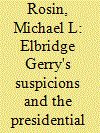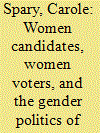| Srl | Item |
| 1 |
ID:
126348


|
|
|
|
|
| Publication |
2013.
|
| Summary/Abstract |
Defenders of the Electoral College frequently assert that victory in the Electoral College requires a winning candidate to "produce a coalition of states with wide and diverse interests" thereby producing "a broadly based electoral victory." These defenders never stop to consider the fact that in a close election the difference between the winning and losing coalition of states may depend on highly contingent factors. In a 2003 article in this journal Neubauer and Zeitlin demonstrated that George W. Bush's Electoral College victory in 2000 depended on the size of the House of Representatives. In this article I demonstrate that the outcome of the 2012 election could have depended on the 2012 Electoral College being based on the newly apportioned incoming House rather than the previously apportioned outgoing House. This is a statutory specification rather than a constitutional requirement. It could be changed by simple legislation. We have Elbridge Gerry's suspicions to thank for this statutory contingency!
|
|
|
|
|
|
|
|
|
|
|
|
|
|
|
|
| 2 |
ID:
173330


|
|
|
|
|
| Summary/Abstract |
Gender quota campaigns to increase women’s parliamentary presence in India have been ongoing for more than twenty years. Meanwhile, each general election results in the slow growth of women MPs, partly due to political parties nominating few women. The 2019 election was no different in this respect –women still make up fewer than 15% of lower house MPs. Incidents of gendered violence against women candidates also contributed to a characterisation of 2019 as a ‘toxic’ election, and will likely further discourage women’s entry into politics. One positive development, however, was two regional parties’ implementation of voluntary party gender quotas in their parliamentary candidate nominations. This article focuses on women’s political participation as candidates and voters in the 2019 parliamentary election. Parties are scrutinised as key gatekeepers for women’s political recruitment. The article also discusses the new narrative of the growing power of women voters in India, exemplified by closing gender gaps in voter turnout, and representing another aspect of women’s political engagement, potentially influencing parties’ responsiveness to women voters. The article concludes by discussing the broader implications and significance of the 2019 election, areas for further research, and prospects for women’s participation and representation in the new parliament.
|
|
|
|
|
|
|
|
|
|
|
|
|
|
|
|